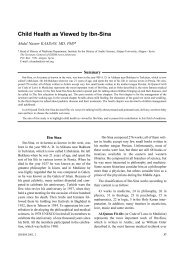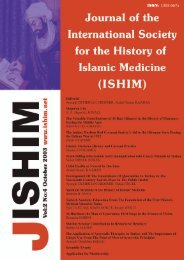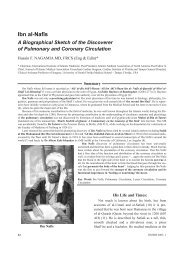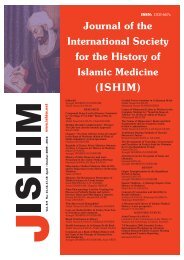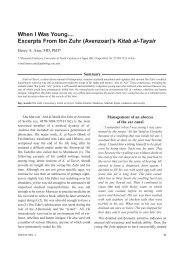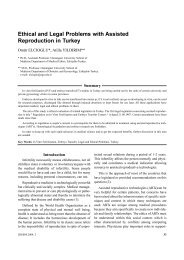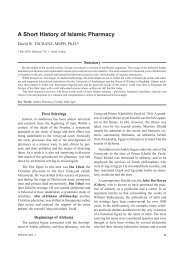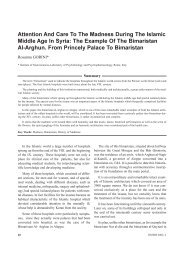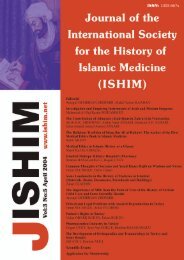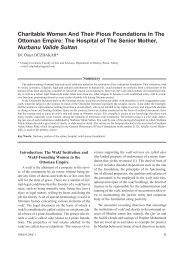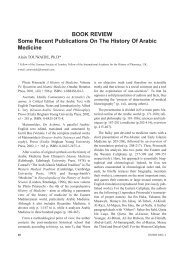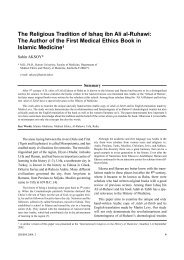Journal of - International Society for the History of Islamic Medicine
Journal of - International Society for the History of Islamic Medicine
Journal of - International Society for the History of Islamic Medicine
Create successful ePaper yourself
Turn your PDF publications into a flip-book with our unique Google optimized e-Paper software.
<strong>Islamic</strong> <strong>Medicine</strong> and Future Western biomedicine:<br />
Potential Areas <strong>of</strong> Integration<br />
Arthur SANIOTIS<br />
ment <strong>of</strong> new ways <strong>of</strong> learning and understanding different<br />
cultures. Muslims also believed that <strong>the</strong>ir political and<br />
military power should be complemented with scientific<br />
knowledge in order to foster mature authority (21). Moreover,<br />
<strong>for</strong> Muslims a sound scientific base would prove beneficial<br />
as a method <strong>of</strong> protecting Islam against o<strong>the</strong>r ideologies.<br />
There<strong>for</strong>e, <strong>the</strong> appropriation <strong>of</strong> science was a way <strong>of</strong><br />
streng<strong>the</strong>ning faith amongst Muslim lay and expanding <strong>the</strong><br />
<strong>the</strong>oretical scope <strong>for</strong> Muslim philosophers.<br />
The basis <strong>of</strong> <strong>Islamic</strong> philosophy and medicine was largely<br />
in<strong>for</strong>med by <strong>the</strong> Greek scientific and philosophical traditions.<br />
Muslims found in <strong>the</strong> Greeks ideas and methods<br />
that promoted logic and science through investigation and<br />
analysis. An understanding <strong>of</strong> Greek knowledge also gave<br />
Muslims an ideological bulwark against Christians where<br />
<strong>the</strong> <strong>for</strong>mer found <strong>the</strong>mselves in Hellenised countries (27).<br />
Galenic and Aristotelian ideas were incorporated in <strong>Islamic</strong><br />
philosophy and medicine. The Aristotelian model proved<br />
significant as it provided an explanatory tool <strong>for</strong> <strong>the</strong> separation<br />
<strong>of</strong> <strong>the</strong> soul from <strong>the</strong> body after death (26). Aristotelian<br />
logic and taxonomy <strong>of</strong> natural phenomena also provided a<br />
viable analytical and experimental method <strong>for</strong> Muslim scientists.<br />
Muslim philosophers like Al-Kindi (800-870 C.E)<br />
and Al-Farabi (d. 950) attempted to merge Platonic and<br />
Aristotelian lore with Quranic revelation, <strong>the</strong>reby providing<br />
an ideological bridge between faith and reason (28). Al-<br />
Farabi had attempted to demonstrate that <strong>the</strong> correct use <strong>of</strong><br />
logic could assist in explaining religious ideas (29).<br />
Galen’s medical ideas which used Hippocratic concepts,<br />
as well as, his own innovations elucidated a humoral <strong>the</strong>ory<br />
<strong>of</strong> <strong>the</strong> body which was taken up by Muslim physicians.<br />
Fur<strong>the</strong>rmore, Galenic medicine proposed an explanatory<br />
model <strong>of</strong> body, spirit and soul that melded with <strong>Islamic</strong><br />
<strong>the</strong>ology to <strong>the</strong> production <strong>of</strong> a religious based model <strong>of</strong><br />
medicine (26). For this reason many Muslim physicians<br />
excelled at both medicine and philosophy as befitted by <strong>the</strong><br />
term ‘hakim’ (Arabic: ‘wise’) which was conferred on physicians<br />
(30). According to Elkadi, <strong>Islamic</strong> medicine should<br />
comprise <strong>the</strong> following criteria: It must adhere to <strong>Islamic</strong><br />
teaching; must be comprehensive and benefitting society;<br />
utilise logic in practice through scientific analysis and experimentation;<br />
be universal in its approach; be superior as<br />
a healing art by observing a holistic approach (13).<br />
It would be a misnomer to suggest that <strong>Islamic</strong> science<br />
and medicine was a copy <strong>of</strong> previous and extant civilisations.<br />
Muslim science and medicine excelled at re-syn<strong>the</strong>sising<br />
ideas into a comprehensive system that was based on<br />
religion. Religious based <strong>Islamic</strong> medicine fur<strong>the</strong>r refined<br />
Hippocratic and Galenic ideas as characterised by <strong>Islamic</strong><br />
medicine’s major figures: Al-Razi (865-925 C.E), Al-Zah-<br />
rawi (936-1013 C.E), Ibn Sina (980-1037 C.E), Ibn Rushíd<br />
(1126-1198 C.E), and Ibn Nafis (1213-1288 C.E). Each <strong>of</strong><br />
<strong>the</strong>se physicians created specialisations including surgery,<br />
epidemiology, virology, orthopaedics, ophthalmology, psychology,<br />
pharmacology, public health, anatomy and physiology.<br />
For example, Al-Zahrawi developed over 200 surgical<br />
instruments and expedited various surgical techniques<br />
and understandings <strong>of</strong> <strong>the</strong> body. Similarly, <strong>the</strong> polymath<br />
Ibn Sina (Avicenna) wrote a fourteen volume medical<br />
treatise called ‘The Canon <strong>of</strong> <strong>Medicine</strong>’ (Al-Qanoon fi al-<br />
Tibb), a masterful compendium <strong>of</strong> medical lore that was a<br />
principle medical text <strong>for</strong> Muslim and European physicians<br />
<strong>for</strong> six hundred years. Some <strong>of</strong> <strong>the</strong> key areas <strong>of</strong> Ibn Sina’s<br />
Canon included experimental and clinical trials, <strong>the</strong> concept<br />
<strong>of</strong> quarantine, evidence based medicine, clinical pharmacology<br />
and neuropsychiatry (31) (32) (33). Al-Razi was<br />
a pioneer <strong>of</strong> experimental medicine and ophthalmology,<br />
and made substantial contributions towards understanding<br />
smallpox, measles, and immunology. He also instructed<br />
in medical ethics and advised physicians to advance <strong>the</strong>ir<br />
medical knowledge and making medical improvements.<br />
Al-Razi continued <strong>the</strong> Hippocratic tradition in benefitting<br />
patients and practising beneficence.<br />
Tawhid: The Central Principle <strong>of</strong> <strong>Islamic</strong> <strong>Medicine</strong> and<br />
Concept <strong>of</strong> Health<br />
<strong>Islamic</strong> science and medicine are based on <strong>the</strong> concept<br />
<strong>of</strong> Tawhid. Contained in this concept is <strong>the</strong> absolute<br />
oneness <strong>of</strong> God as expressed in <strong>the</strong> first half <strong>of</strong> <strong>the</strong><br />
shahadah (testament <strong>of</strong> faith) (Lā ‘ilāha ‘illā Allāh: <strong>the</strong>re<br />
is no god but God). Tawhid is <strong>the</strong> underlying basis <strong>of</strong> all<br />
universal phenomena since cosmic space and time submit<br />
to <strong>the</strong> Divine being. <strong>Islamic</strong> cosmology emphasises that<br />
<strong>the</strong> hierarchy <strong>of</strong> existence is dependent on <strong>the</strong> One by His<br />
command (‘kun’ Arabic: ‘be’). The Divine command interconnects<br />
all levels <strong>of</strong> time/space that contains <strong>the</strong> phenomenal,<br />
angelic and archangelic realms (34). Creation is an<br />
act <strong>of</strong> Divine mercy (rahma) and is characterised by al-fitra<br />
(natural order) which is composed <strong>of</strong> <strong>the</strong> illimitable metapatterns<br />
reflecting symmetry, harmony and beauty. All existence<br />
possesses al-fitra in various levels and stages. For<br />
example, <strong>the</strong> fitra <strong>of</strong> <strong>the</strong> human body alludes to its beauty<br />
and perfection. Fitra also alludes to natural processes such<br />
as blood flow in human and animal bodies and how certain<br />
actions befit a ‘natural state’ such as circumcision, correct<br />
parenting and showing proper respect to elders.<br />
In Islam, nature is considered to be book <strong>of</strong> majestic<br />
and wondrous design based on universal laws which<br />
underlie Tawhid. Closely associated with Tawhid is <strong>the</strong><br />
ISHIM 2011-2012<br />
89



